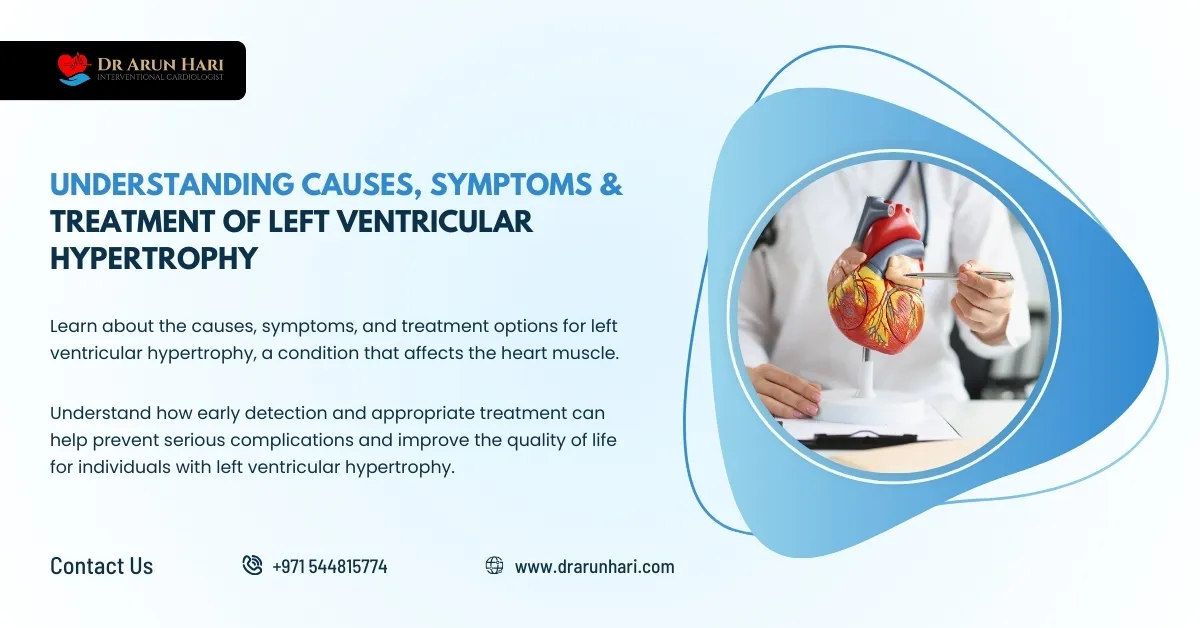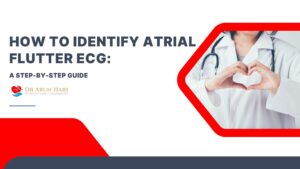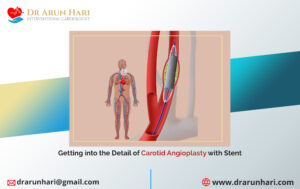Left Ventricular Hypertrophy Cases in Abu Dhabi: A Shocking Ascent!
In Abu Dhabi, United Arab Emirates, the occurrences of cardiovascular conditions like left ventricular hypertrophy (LVH) have been on the rise, impacting a sizable portion of the population here. A study conducted by the Abu Dhabi’s Department of Health has reported that almost 25 percent of people, who have been diagnosed with hypertension, tend to exhibit signs of left ventricular hypertrophy also. This makes it a critical concern in this area. Such a statistic tends to emphasize the grave significance of early diagnosis along with expert medical intervention to safeguard long-term cardiac complications & ill-effects associated with LVH.
What is Left Ventricular Hypertrophy?
LVH refers to the thickening of the muscle tissue in the left ventricle, which is the heart’s main pumping chamber. Such a condition tends to develop when the heart works harder to pump blood, usually owing to high BP or any other such underlying heart issue. Over time, this thickening tends to make the heart less efficient at the task of pumping blood, resulting in an augmented strain & risk of heart failure, arrhythmias, & other cardiovascular complications. While left ventricular hypertrophy can happen without any noticeable symptoms in its early stages, it can ultimately result in serious health issues if left untreated. The condition is often detected through a left ventricular hypertrophy ECG (electrocardiogram). It records the heart’s electrical activity, allowing doctors to detect any abnormal heart rhythms as well as structural changes.
Left Ventricular Hypertrophy Symptoms
The symptoms of left ventricular hypertrophy vary depending on the severity of the condition. Many people might not have any symptoms initially, but as the disease progresses, they can possibly develop noticeable signs of cardiac distress. If such symptoms are present, it is essential to seek medical attention as they indicate its progression, potentially resulting in serious cardiac complications. Regular screenings & early diagnosis can help manage the condition much more effectively. Common left ventricular hypertrophy symptoms include the ones given below:
- Fatigue
- Light-headedness
- Palpitations (rapid heartbeats)
- Dizziness/fainting (syncope)
- Chest pain or chest discomfort (angina pain)
- Shortness of breath, specifically while doing any physical activity
Left Ventricular Hypertrophy Causes
Left ventricular hypertrophy causes can usually be associated to conditions that force the heart to work harder than usual. The primary reason is high BP (or hypertension). This increases the workload of the left ventricle. Over time, such constant pressure forces the heart muscle to thicken, just as skeletal muscles tend to enlarge with regular exercises. Understanding such causes is crucial for prevention & early intervention. Regular BP & lifestyle modifications can help in reducing the long-term risks of developing LVH. Other causes of this condition include the following:
- Aortic valve stenosis: This refers to the narrowing of the valve between the left ventricle & the aorta. It causes the heart to work harder for pumping blood through a smaller opening.
- Hypertrophic cardiomyopathy: This is a genetic condition that leads to the abnormal thickening of the heart muscles, independent of BP issues.
- Obesity: Excess body weight can put extra strain on the heart, contributing to LVH.
- Intense athletic training: Long-term, rigorous exercises can cause the heart muscle to thicken as an adaptation to augmented physical demands.
- Chronic kidney disease: This condition can result in high BP & fluid overload, both of which tend to contribute to LVH.
Left Ventricular Hypertrophy Treatment
The treatment of left ventricular hypertrophy focuses on addressing the underlying causes & preventing further heart damage. Early intervention can substantially improve life expectancy with left ventricular hypertrophy & decrease the risk of complications like arrhythmias, heart failure, or even sudden cardiac arrest. While it cannot always be reversed, proper management can considerably improve a patient’s quality of life & lower the risk of severe cardiac events. With the right treatment approach, it is very much possible to control this condition & live a healthy, active life. The key left ventricular hypertrophy treatment options include:
- Medicines: Antihypertensive medications like beta-blockers, calcium channel blockers, & ACE inhibitors are usually prescribed to control BP & lower the strain on the heart.
- Lifestyle changes: Dietary modifications, regular exercising, & weight management tend to be the essential components of left ventricular hypertrophy treatment. Lowering your salt intake, managing stress, & smoking cessation can also help alleviate the symptoms.
- Surgical intervention: In some cases, especially when aortic valve stenosis or other structural heart defects are there, surgery might be needed for correcting the issue & for reducing the heart’s workload.
- Monitoring & follow-ups: Regular check-ups & ECGs are crucial for regular monitoring of the progression of this condition. Such tests help healthcare providers evaluate the effectiveness of treatments & thus make required adjustments.
Contact Dr. Arun Hari at LLH Hospital, Abu Dhabi for Expert Treatment
If you or any of your loved one has been experiencing left ventricular hypertrophy symptoms, it is highly essential to seek expert care from a specialist. Dr. Arun Hari in Abu Dhabi at the LLH Hospital is an experienced cardiologist here who specialises in diagnosing & treating a vast array of cardiovascular conditions, including left ventricular hypertrophy.
Managing Your Heart Health
Dr. Hari and his team provide advanced diagnostic tools like ECGs & echocardiograms to accurately assess your condition & monitor your heart. His approach to left ventricular hypertrophy treatment combines progressive medical therapies with personalised lifestyle advice to help patients manage their condition effectively.
For a Healthier Heart!
To book an appointment with Dr. Arun Hari and learn more about how to manage it, visit him at the LLH Hospital, Abu Dhabi, UAE. His team is committed to providing comprehensive care to help you achieve optimal heart health.
Conclusion: Taking Control of Left Ventricular Hypertrophy
This happens to be a serious heart condition that needs timely intervention to prevent life-threatening complications. While it cannot always be cured, proper management, including medicines, lifestyle modifications, & regular monitoring, can improve life expectancy with left ventricular hypertrophy to enhance the quality of life of patients. Understanding the causes, recognising the symptoms, and seeking professional medical advice happen to be the critical steps in managing this condition. If you suspect that you or anyone dear to you may have left ventricular hypertrophy, do not hesitate to consult Dr. Arun Hari to receive the best possible care. By addressing this condition early & following the appropriate left ventricular hypertrophy treatment plan with him, you can protect your heart & ascertain a healthy future.





